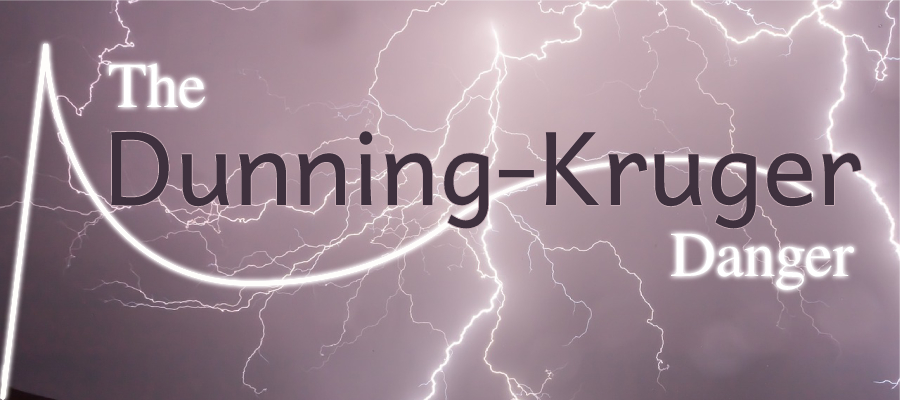The Dunning-Kruger Danger
Confidence is essential for leaders. However, sometimes the level of that confidence is unwarranted. Moreover, such confidence becomes dangerous when the leader is unaware that such confidence is unwarranted.
The Dunning-Kruger Effect is a psychological phenomenon in which individuals with low levels of competence overestimate their abilities and underestimate the abilities of others. Sometimes labeled as the “over-confident novice,” those affected by this particular type of bias face many negative consequences, both for the individual and society as a whole.
The dangers present themselves in various ways. One risk of the Dunning-Kruger Effect is that it can lead to overconfidence and poor decision-making. We do not know what we do not know, but a false sense of knowledge and confidence can sometimes inflate our true abilities and lead us to make poor decisions regarding the things we are ignorant about.
A unique danger is found in the over-confidence element. Individuals who overestimate their abilities may take on tasks or responsibilities they are unprepared for, leading to poor performance and potential failures. This can have serious consequences, especially in high-stakes situations involving public safety, health, or financial risk.
Another danger of the Dunning-Kruger Effect is that it can create an unwarranted sense of superiority, leading to arrogance and a lack of humility. In such situations, the individual may present as bellicose or overly boastful. Ultimately, this can damage relationships and create tension in both personal and professional settings.
The Dunning-Kruger Effect can also lead to a lack of willingness to learn and grow. Individuals who overestimate their abilities may see no need to seek new information or feedback, leading to a stagnation of knowledge and skills. Ironically, this pattern only ensures continued ignorance.
Overall, the Dunning-Kruger Effect can have serious consequences for individuals and society. It is important to recognize the potential for this bias and work to overcome its pitfalls. Doing so allows us to make more informed and accurate assessments of our abilities and those of others.
Leaders Are Particularly Susceptible
Leaders are particularly susceptible to the Dunning-Kruger Effect. A number of factors may contribute to the prevalence of the Dunning-Kruger effect among leaders. However, confidence, a lack of feedback, groupthink, and exposure limitations are probably some of the biggest.
Confidence: Confidence is often seen as a desirable trait in leaders. However, it is possible that some leaders may be more confident than warranted. This overconfidence can lead to the Dunning-Kruger effect.
Lack of feedback: Leaders may not receive as much honest feedback as others. This is especially true if the leader demands compliance or rules via fear. However, this lack of accurate feedback can make it difficult for leaders to accurately assess their abilities, often leading to overestimating their skills and knowledge.
Groupthink: The pressure to conform to the opinions of others within a group can lead to a phenomenon known as groupthink. In these situations, the group’s members may go along with a decision even if it is not the best one. This can lead to the selection of leaders who are not as competent as they believe themselves to be.
Limited exposure: Leaders who have limited exposure to a particular domain may not have the necessary knowledge and skills to accurately assess their own abilities, leading to the Dunning-Kruger effect. This may seem straightforward. However, misconceptions regarding the difficulty or ease of various tasks are common drivers.
Overall, it is likely that a combination of these listed factors. Moreover, other factors not listed can also contribute to the Dunning-Kruger Effect’s prevalence among leaders. Thankfully, there are things that leaders can do to ensure they do not succumb to this dangerous bias.
Overcoming Dunning-Kruger
While this bias can have serious consequences, there are a few ways to overcome or guard against it. The biggest defense is found by becoming more self-aware. So, here are a few strategies for improving self-awareness and avoiding the pitfalls of the Dunning-Kruger Effect.
Seek out feedback: One of the best ways to accurately assess your abilities is to seek feedback from others. Sometimes this requires a tough conversation about your performance. While it might be difficult to listen to constructive criticism (especially from subordinates), acquiring accurate feedback can help to provide a more realistic view of your strengths and weaknesses.
Practice humility: It is important to recognize that we all have areas where we are not as skilled or knowledgeable as others. Why anyone would want to do it all or know it all seems crazy and unachievable. Regardless, we can be more open to learning from others and more willing to seek new information by cultivating a sense of humility.
Keep an open mind: Remember, we do not know what we do not know and cannot know everything. The Dunning-Kruger Effect can be fueled by a closed-minded attitude that resists new ideas or information. Therefore, we must be willing to let in new ideas and perspectives. Keep an open mind and listen to ideas that may challenge your own.
Seek out diverse perspectives: Do you want to be “right,” or do you want to be accurate? Exposure to diverse perspectives can help to broaden our understanding and challenge our assumptions. By seeking out diverse viewpoints, we can become more accurate because we are more likely to challenge and destroy misconceptions.
In closing, I will say that the Dunning-Kruger Effect is much more than an ego problem. It is a potentially dangerous cognitive bias that leaders must proactively work to keep in check. If they do not keep it in check, they risk destroying their credibility, organizations, and relationships.
Be sure to check out my article titled Leadership, Learning, And Critical Reflection.




